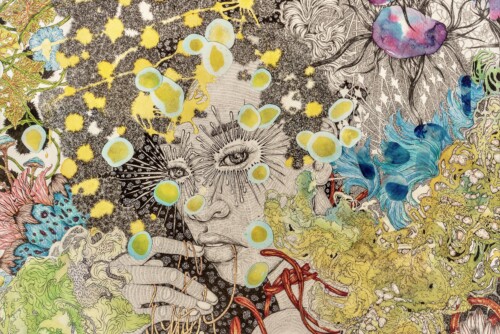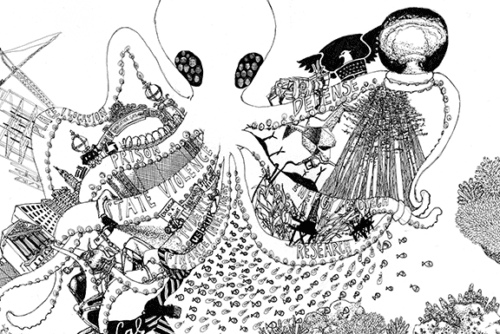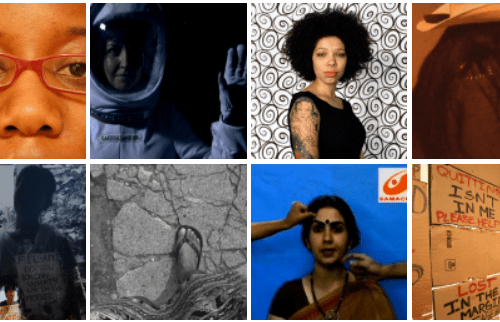Caribbean Feminisms: Interventions in Scholarship, Art, and Activism across the Region
In the spring of 2015, the Barnard Center for Research on Women (BCRW) began a literary series entitled “Caribbean Feminisms on the Page.” A collaboration between Tami Navarro, the BCRW associate director, and Kaiama L. Glover, an Ann Whitney Olin professor of French and Africana studies at Barnard College, the series brings Caribbean thinkers together in conversation to demonstrate the complexity of feminist thought and practice across the region. The series invites established authors to engage in a moderated conversation with emerging writers, a structure that both enables intergenerational exchange and provides an opportunity for first-time authors to engage with writers whose work has deeply affected their own. The first event in this series was held in October 2015, and gave new writer Tiphanie Yanique an opportunity to be in conversation with Jamaica Kincaid, who had long influenced their work.
Subsequent events have included Edwidge Danticat and Victoria Brown, Gloria Joseph and Naomi Jackson, Maryse Condé and Fabienne Kanor, Claudia Rankine and Dionne Brand, Roxane Gay and Katia Ulysse, and Erna Brodber and Nicole Dennis-Benn. Several of these conversations are included in the “Videos” section of this current issue of Scholar and Feminist Online.
The literary pairings of “Caribbean Feminisms on the Page” draw important and necessary attention to writers who center the Caribbean and its diasporas in their work. By complicating narratives of the region as either an idyllic paradise or a cluster of dystopian outposts, these conversations offer participants a platform from which to think through and articulate their nuanced experiences as writers and as diasporic subjects. Emerging from the literary series, this issue of Scholar and Feminist Online began with a desire to share the experience of these conversations with a larger audience. As we moved through the process of compiling the issue, however, life intervened: There were a number of difficult losses, including the passing of Michelle Cliff, Andaiye, and Paule Marshall. There was also joy, as we discovered the enduring resonance of Andaiye’s admonition to create “conspiracies of mutual caring” to safeguard our dignity and recognize our shared humanity. We would come to need this insight more than we could know as the region began to feel the devastating impacts of climate change, including two Category 5 hurricanes (Hurricanes Irma and Maria) within the span of a month in 2017 and Hurricane Dorian in 2019. Given all of this, the shape of this issue necessarily changed from memorializing valuable conversations to something more textured and complex that reflects both the joy and the sorrow experienced in and across the region in recent years. Of course, the material included in this issue is not an exhaustive collection of recent intellectual and artistic production in the Caribbean. Rather, it is illustrative and forward-looking, turning to emerging artists and academics working from and dwelling on the region.
Caribbean Feminisms on the Page and in the Streets
As we write this introduction in the fall of 2019, Hurricane Dorian has ravaged the Abacos and Grand Bahama in the Bahamas, placing Caribbean people on the front lines of the climate crisis for yet another year. As the climate crisis reveals – and deepens – existing inequalities and injustices for anyone who is a migrant; face an even more daunting prospect of rebuilding. Caribbean thinkers such as Andaiye (whose writing appears in this volume) and Sylvia Wynter were both, rightly, convinced of the inability of mainstream feminisms to serve as a foundation for a liberation project that begins with the needs of and the harms faced by those made most vulnerable and abject. Caribbean feminisms at their most expansive, creative, complex, and self-reflective provide a viable and vibrant resource for broad-based movements for change.
Recent events across the region have brought to the fore the necessity of a feminist politics grounded in an intersectional analysis of vulnerability. For instance, the November of 2016 #lifeinleggings rallying cry for Caribbean women and nonbinary persons who shared stories of sexual violence, sexual harassment, and gender-based violence ignited a movement which would see thousands take to the streets in several Caribbean countries and inspire other movements like #levedominik in Dominica. It is significant that women’s and LGBTQ organizations engage in mutual acts of solidarity and are at the forefront of political organizing against human rights abuses: the Caribbean Women and Sexual Diversity Conference (CWSDC) epitomizes this kind of cross-cutting, intergenerational solidarity politics. In 2017, eight transgender women and men formed a regional activist group during the fifth CWSDC. CWSDC has proven to be a space which celebrates the sexual and gender diversity, creativity, and complexity of Caribbean people rooted in an explicitly feminist politics and a desire to learn from Caribbean feminist legacies and histories.
Crucial organizing work across the region has been undertaken by a broad cross section of the community, including scholars, artists, and activists. In Trinidad and Tobago, a protest organized by Atillah Springer and Angelique Nixon and supported by local feminists groups such as WOMANTRA forced the resignation of the Port of Spain mayor after his dismissive comments following the death of Japanese pannist Asami Nagakiya during carnival in 2016. The 2017 rise of the tambourine army in Jamaica against rape culture, complete with reggae anthem “Nah Mek Dem Win” by singer-songwriter and trafficking survivor Keisha Firmm, extended the antiviolence momentum generated by regional activism.
The significance of the emergence of a feminist politics connecting economic and ecological justice to questions of gender-based violence, gender self-determination, and sexual citizenship is undeniable. So, too, is the importance of feminist voices in regional political consciousness. Yet feminist organizing remains the region’s most consistent dissident voice (when it manages to eschew reactionary respectability politics). 1 A central aim of this journal issue is to highlight this ongoing – and vital – project of naming and working to eradicate injustice through feminist organizing.
As coeditors of this special issue, we are deeply committed to highlighting scholarship and activist work, as well as art, in the region, as this work is often deeply interwoven into feminist movements. The centrality of the arts to a Caribbean feminist consciousness is reflected in the rise of contemporary women artists from the region whose work explicitly engages themes of embodiment, gender, sexuality, and social stratification such as Ebony Patterson (Jamaica), Brianna McCarthy (Trinidad and Tobago), Tessa Mars (Haiti), Briheda Haylock (Belize), Sheena Rose (Barbados), and Simone Asia (Barbados), whose Afro-futurist work is included in this volume. Poet Shivanee Ramlochan has emerged as one of the most urgent and inventive voices of her generation with her stunning debut collection Everyone Knows I am a Haunting. One of her poems is reproduced with permission here. Textuality has always been important to Caribbean feminist organizing as evidenced by magazines produced by Sistren and the Caribbean Association for Feminist Research and Action as well as cyberfeminist blogging and online engagement. Gabrielle Hosein’s Diary of a Mothering Worker, now reproduced as a column in the Trinidad Newsday; Alissa Trotz’s “In the Diaspora” column; and Akola Thompson’s Minority Report represent public intellectual and political engagement from an unapologetically Caribbean feminist perspective.
The collection seeks to honor Caribbean feminisms past, present, and future through highlighting the creative work and scholarship that are central to feminist consciousness-raising. Included in this collection are three conversations between the Caribbean women writers Erna Brodber and Nicole Dennis-Benn, Roxane Gay and Katia D. Ulysse, and Jamaica Kincaid and Tiphanie Yanique; as well as poetry by Shivanee Ramlochan, Alexis Pauline Gumbs, and Tiphanie Yanique.
Kamala Kempadoo urges us to take seriously sexual-economic exchange as a social justice frontier and a defining feature of Caribbean sexualities. Gabrielle Hosein offers post-indentureship feminism as a new conceptual framework for understanding feminist thought and organizing in the region, while Tonya Haynes examines silences around sexuality in Caribbean gender and development studies. Invoking Audre Lorde’s The Cancer Journals, Andaiye’s keynote, delivered by Alissa Trotz and Joy Marcus at the Opening Ceremony of the thirteenth Caribbean Institute for Gender and Development, renders a personal-political examination of illness and inequality. Debra Providence emerges as a fresh and distinct voice in feminist literary criticism offering up new modes of engaging Nalo Hopkinson’s foundational text, The Midnight Robber. Kelly Baker Josephs remembers Michelle Cliff and Kaiama L. Glover’s essay serves as timely reminder to feminist activists and advocates of the material and geopolitical stakes involved in bearing witness and offering testimony. We trust that this collection conveys something of the preoccupations and possibilities of Caribbean feminisms at their most inclusive, creative, and urgent.
- For example, in 2014, Red Thread Women’s Organisation, supported by Guyana Trans United, Society against Sexual Orientation Discrimination, and the Amerindian People’s Association, staged a protest at the Ministry of Heath against the multiple violations by the state against an Indigenous woman who survived sexual assault by two businessmen. Essential to this regional movement are linkages between scholar-activists and artists as well as local and regional community building at the grassroots, online, and in regional courts. Several singular examples illustrate this reality: Sistren Theatre Collective’s takeover of Jamaica parliament in support of access to safe and legal abortion in 2009 is a signal example of the political possibilities of arts-based activism. The University Rights Advocacy Programme, which secured both Caleb Orozco’s successful constitutional challenge to Section 53 of the Criminal Code of Belize, which criminalized same-sex sexual activity, and the Caribbean Court of Justice’s ruling in favor of four transgender Guyanese women challenging the constitutionality of the law that criminalizes “cross-dressing for an improper purpose.”[↑]



